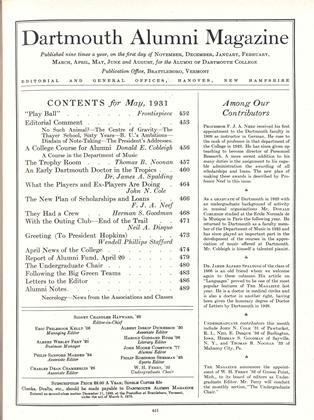And that brings us around to The Players again. Will they never give us a chance to pan them? We do not set ourselves up in the role of critic, so I guess that it's all right to go ahead and call their most recent production, "Berkeley Square," swell. Warner Bentley has done one more good job. He has a fine knack for casting his talent in just the right way, and the sizeableness of the production must have made it all the more difficult. Anyway, the story of Peter Standish's return to seventeenth century England was enthusiastically received by a goodly house. It certainly maintained the fine reputation which has been the Players' as long as we are able to remember. It is useless to mention names in connection with a thing as generally well-done as was this—it is enough merely to say that the whole bunch done noble, to use the Dartmouth's editorial cliche.
Already they are at work on the play, "Topaze," which is to be given on Spring house-party week-end. From the few previews which we have been fortunate enough to have, it promises to be at least as great a success as "Berkeley Square." It has been taken from the New York and Paris hit of the past season, and is eminently suited to the Hanoverian stage. It is unique in that it uses a good many of the grammar school children of Hanover, in the first act.
We think it very possible that this Players bunch is just about the least appreciated around the college. To be sure, all their shows are well attended, and people clap a lot, but the fact remains that they go in at eightthirty and come out at ten-thirty almost completely to forget it right away. When one reflects that a proportion of a man's time at least equivalent to that consumed by daily attendance at the Nugget and the concomitant bull-session is taken up week in and week out after the first rehearsal of a play, the affair assumes an almost heroic aspect. Of course, there's nothing to be done about it—no one would protest more vigorously than the Players themselves if any interference that way were suggested—but it may be that we will clap a little harder and longer next time, having just convinced ourselves that we have been completely underestimating our subject.
 View Full Issue
View Full Issue
More From This Issue
-
 Class Notes
Class NotesCLASS OF 1930
May 1931 By Albert I. Dickerson -
 Class Notes
Class NotesCLASS OF 1910
May 1931 By "Hap" Hinman -
 Lettter from the Editor
Lettter from the EditorEditorial Comment
May 1931 -
 Article
Article(A Centennial Memorial)
May 1931 By Dr. James A. Spalding '66 -
 Class Notes
Class NotesCLASS OF 1929
May 1931 By Frederick W. Andres -
 Class Notes
Class NotesCLASS OF 1924
May 1931 By C. Jerry Spaulding
Wilbur H. Ferry '32
-
 Article
ArticleThe Undergraduate Chair
MAY 1931 By Wilbur H. Ferry '32 -
 Article
ArticleMUSICAL CLUBS
MAY 1931 By Wilbur H. Ferry '32 -
 Article
ArticleCONCERT SERIES
MAY 1931 By Wilbur H. Ferry '32 -
 Article
ArticleDEBATERS
MAY 1931 By Wilbur H. Ferry '32 -
 Article
ArticleOTHER THINGS
MAY 1931 By Wilbur H. Ferry '32 -
 Article
ArticleMILESTONES
MAY 1931 By Wilbur H. Ferry '32








